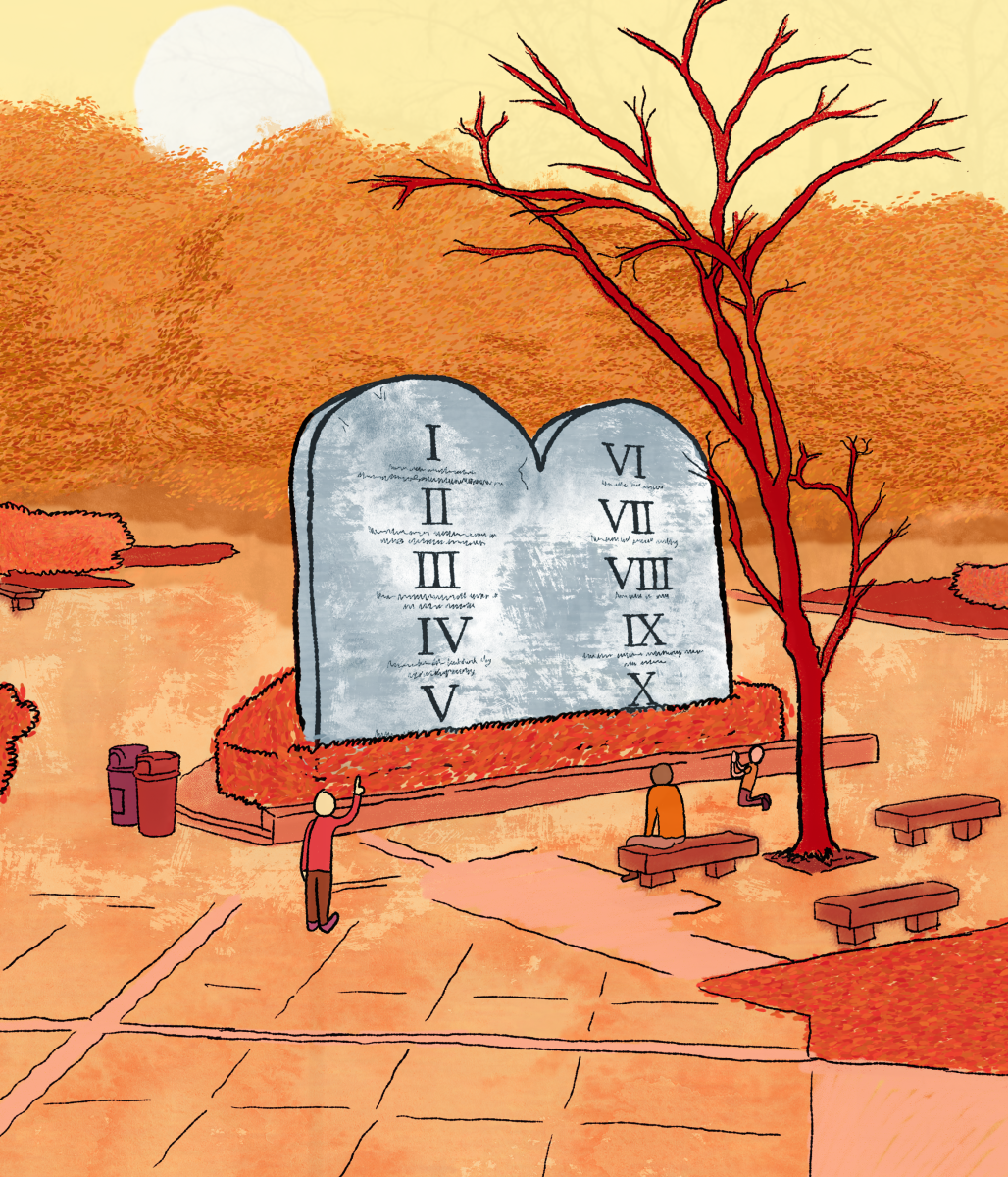Governor Jeff Landry signed Act 676 into law on June 19. More commonly called the Ten Commandments Law, it will require the postage of the Ten Commandments in every publicly funded classroom.
Currently, the law is receiving pushback from many Louisiana residents, and the ACLU will be representing several parents in a suit for infringing on their civil rights. As a result of the suit, any new regulations or decisions made about the Ten Commandments’ presence in classrooms will be tabled until Nov. 15.
The law, however, is still contentious.
Jack Hanks, a member of LSU’s College Republicans, advocated for the law and its implementation.
“The Ten Commandments serve as a foundation for what makes a good person outside of its religious context. The Ten Commandments inspired the Founding Fathers when they created this great nation,” he said. “We look forward to the implementation of this bill along with the many other reforms passed to improve education in the state.”
LSU Religious Studies professor Lauren Griffin finds the bill interesting on a more conceptual level.
“What I find interesting about this Louisiana bill and similar bills coming from other states is how concepts like church/state and private/public function in society,” she said.
The Ten Commandments law and others like it are causing more conversations around the idea of the separation of church and state, which has been an American principle since before the creation of the United States, Griffen said.
“My own interest focuses on a slightly different question: how do moments like this help actually construct ideas of what is considered ‘religious’ and what is considered ‘secular’?” she said.
Griffen thinks the issue for many with the law is that it forces a religious text in a public setting, and many see the law as a violation of their First Amendment rights. The ACLU claimed that the law “unconstitutionally pressures students into religious observance, veneration, and adoption of the state’s favored religious scripture.”
“Both Louisiana and Oklahoma’s directives are built on the argument that texts like the Bible and the Ten Commandments (based on biblical texts) are ‘historical’ rather than ‘religious.’ The strategy, at least on paper, is to present these documents alongside other historical documents in United States history,” Giffen explained.
She said the authors of these laws attempt to legitimize the use of these texts as historical documents, and if this goes through, it would allow room for other religious texts to be actively included in public settings. Griffin continued by posing this question, “But what are the social consequences of continuing to insist that these texts are merely historical, and not religious?”
Griffin introduced a church-state case, Lynch v. Donnelly, from 1984. In this case, a town was sued for including a nativity scene in its holiday decorations. The court ruled in favor of the town. Griffin drew special attention to the dissenting opinion, as Justice Harry Blackmun saw the inclusion of the nativity in a secular space as erasing its religious importance.
“Religion, particularly Christianity, was never separate from public life. By making the Ten Commandments and the Bible ‘merely historical’ and part of ‘culture,’ it opens them up to the type of sustained critical engagement we have with other historical documents, inviting analysis and evaluation,” Griffen said. “This is a prime example of how the category of religion does indeed cordon things off or attempts to keep certain cultural items in private spaces. But it also protects—it creates ideas of sacred things that deserve to be set apart.”
Gabriela Juarez is an LSU sophomore and the secretary of membership for LSU’s Students for a Democratic Society (LSU SDS). She believes the Ten Commandments Law’s existence and potential implementation could have severe implications for the state, calling the law an act of “political theatre.”
“This law kind of represents textbook fascism. I think with this new wave of the far-right political movement in America aiming to completely destroy our democratic institutions and undermine our civil liberties, and part of that is they are using Christianity, what they claim to be Christianity, as a cudgel, a weapon to use to attack people that they want to knock down,” Juarez said. “Whether that be the rights of women, the rights of transgender Americans, or the rights of LGBTQ Americans more broadly.”
Juarez said the bill is nothing more than a vessel for hatred, which makes religion, as used by the Ten Commandments Law’s proponents, nothing more than a tool for spreading that bigotry.
Juarez also attacked the basic legality and constitutionality of the law, as she believes there is no legal precedent or basis for it. She believes the issue is cut and dry, and she plans to use the courts’ reaction to the ACLU’s lawsuit as a litmus test for their legitimacy.
“When I look at the ACLU lawsuit, what I am thinking is that if the courts have any legitimacy to them at all if they have any sense in them at all, then they would strike this down immediately because it is blatantly illegal,” she said. “I don’t have any faith in the justice system, but I am hoping that there is some shred of legitimacy left in whatever court this goes to, whatever judge this goes to, that they will be able to make the right call and strike this bill down.”
In regards to the actual roll-out and implementation of the law, Juarez believes it will leave many students feeling unwanted and unwelcome in their classrooms. She believes this is an intended function of the law.
“You are going to be seeing a lot of students who are not Christian, whether they be Jewish, Muslim, Hindu, or Buddhist, or if they don’t have any religion at all. They are going to go into their classroom and they are going to be reminded that they are not wanted there. That they are other, that they are not a citizen in the minds of the legislature,” she said.
Although Juarez believes the situation to be bleak, she still encourages civil action.
“I think it’s important in times like this when we see blatantly illegal bigoted laws that are being forced through our legislature by a governor who doesn’t care at all about the average citizen, it is easy to become hopeless. To think this is the end, to think this is over, that we can’t do anything about it, but we absolutely can do a lot about it,” she said.










